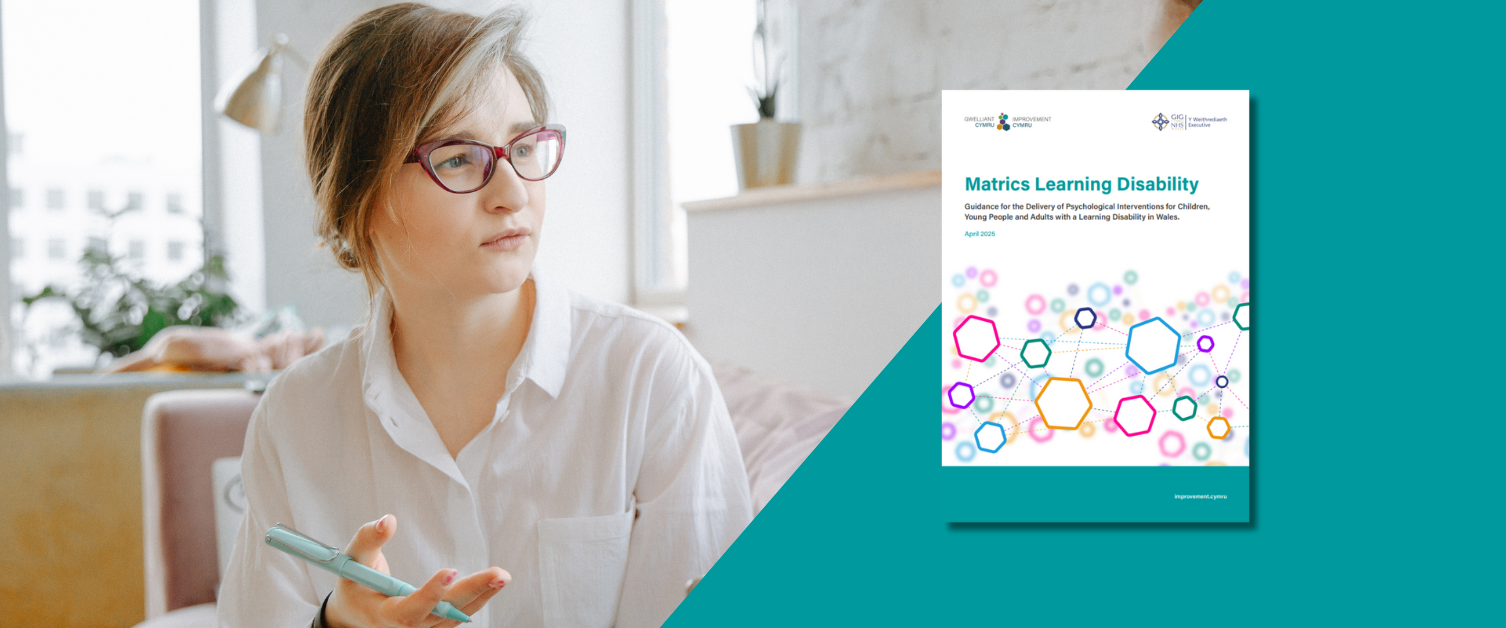New Wales-wide guidance to improve psychological support for people with a learning disability

12 May 2025
New guidance for the delivery of psychological interventions for children, young people and adults with a learning disability in Wales has been published to help improve their health and wellbeing.
The guidance addresses the significant differences in the way that psychological distress presents in people with a learning disability, and the way that psychological interventions need to be delivered.
Care professionals from several local health boards in Wales have authored and contributed to the guidance, which has been published by the NHS Wales Executive and marks a joint commitment to meet the needs of some of the most marginalised people in our communities.
Leading charity Mencap Cymru played a key part in ensuring the guidance was co-developed with people with a learning disability, their parents and carers. Five key principles were agreed through a series of focus groups and qualitative interviews - agency, inclusive, relational, collaborative, and compassion – and their voices were central to the development of the guidance.
 Dominique Bird, Acting National Director for Quality Safety and Improvement in the NHS Executive, said: “The health inequalities experienced by people with a learning disability are wide-ranging. We know they die roughly 20 years earlier than their peers in the general population, they have increased morbidity, and face increased negative factors such as poverty and access to services.
Dominique Bird, Acting National Director for Quality Safety and Improvement in the NHS Executive, said: “The health inequalities experienced by people with a learning disability are wide-ranging. We know they die roughly 20 years earlier than their peers in the general population, they have increased morbidity, and face increased negative factors such as poverty and access to services.
“Providing the right psychological interventions needs a lifespan approach that covers all transition points and recognises the whole story of people with a learning disability, their families, and support structures. This guidance goes a long way to deliver a Wales-wide approach to meet the needs for this population.
“We’re proud to have worked in partnership to create a resource that’s not only informed by evidence, but by lived experience, because real change begins when the people who are affected the most are listened to.”
The guidance has been designed for practitioners, managers, and planners working in health, social care, and third sector organisations. It’s anticipated that those using this guidance will have a good knowledge of psychological therapies and interventions but may wish to receive further guidance about the adjustments and contextual factors affecting people with a learning disability.
The guidance also draws attention to the psychological interventions not used in the current evidence tables being used by practitioners and therapies in Matrics Cymru: Guidance for Delivering Evidence-Based Psychological Therapy in Wales (2017). It’s intended that future evidence tables in Matrics Cymru will be inclusive of people with a learning disability.
The guidance was launched at a British Psychological Society conference in Cardiff. Five of the authors presented the document to delegates at the Faculty for People with Intellectual Disabilities Advancing Practice Conference 2025:
- Dr Helen Delargy, Principal Clinical Psychologist and lead in improving access to psychological interventions for children and young people with a learning disability, Betsi Cadwaladr University Health Board
- Dr Jamie Horn, Consultant Clinical Psychologist/Systemic Psychotherapist, Powys Teaching Health Board
- Dr Caley Hill, Joint Head Learning Disability Psychological Services, Aneurin Bevan University Health Board
- Dr Jennifer McElwee, Psychology Lead for Children with Additional Needs, Aneurin Bevan University Health Board
- Dr Vaughn Price, Senior Academic Tutor/Consultant Clinical Psychologist Doctoral Programme in Clinical Psychology, Cardiff University
The two-day event brings together leading experts, researchers, educators, and advocates in across the psychology field. Delegates have opportunities to share best practices, develop connections in the learning disability community, and share their latest work.
Elsewhere at the conference, a presentation was delivered about another exciting area of work in care for people with a learning disability. Dr Rachel Ann Jones, National Lead for the NHS Wales Executive’s Learning Disability Programme, and Andy Ware, Senior Improvement Manager, shared their progress using System Thinking in Practice (STiP), an emerging management discipline to challenge complex situations, to navigate the multi-setting learning disability landscape in Wales.
Their success has helped them to lead work to enhance patient safety and create sustainable improvements in the health and wellbeing of people with a learning disability in Wales. Visit www.improvementcymru.net/learning-disability to find out more.